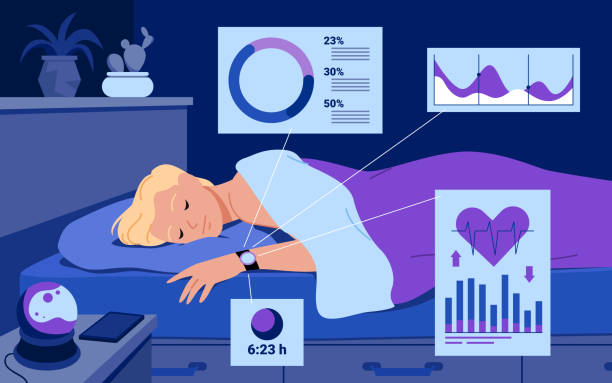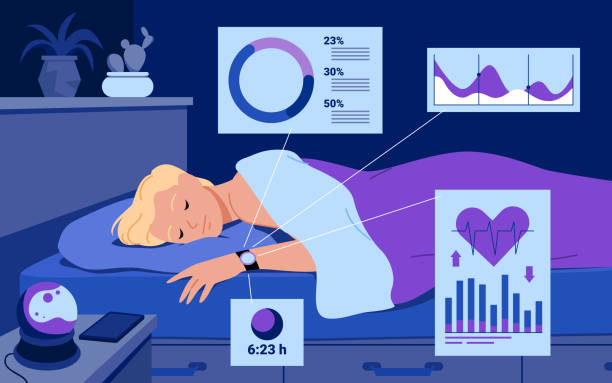Discover how monitoring your sleep patterns can improve your health, productivity, and well-being. Sleep tracking unveils hidden insights that empower you to optimize your rest and rejuvenation.
The Night That Sparked a Transformation
It all started on a restless night. I tossed and turned, staring at the ceiling, frustrated by how exhausted I felt every morning despite my best efforts to sleep eight hours. I realized I was missing a critical piece of the puzzle: understanding what was actually happening while I slept.
That’s when I decided to give sleep tracking a try. What began as curiosity soon transformed my health and lifestyle.
Why Sleep Tracking Matters
Sleep isn’t just about feeling rested; it’s a cornerstone of overall health. Poor sleep can lead to issues like weight gain, weakened immunity, and impaired focus. Yet, many of us go through life without knowing the quality of our sleep.
Sleep tracking changes that. By analyzing patterns, disruptions, and habits, it gives you a clear picture of how well you’re resting and reveals opportunities for improvement.
The Science Behind Sleep
To understand why sleep tracking is so powerful, it helps to know a bit about the science. Sleep consists of multiple cycles, including light sleep, deep sleep, and REM (rapid eye movement). Each phase plays a unique role:
a) Light sleep helps with memory and learning.
b) Deep sleep is crucial for physical restoration and immune function.
c) REM sleep supports emotional processing and creativity.
Tracking your sleep can show you how much time you spend in each phase, helping you identify potential imbalances.
My First Experience With Sleep Tracking
When I started sleep tracking, I used a simple app on my phone. I remember being shocked by the results: though I spent eight hours in bed, I was only getting about five hours of actual sleep. Frequent wake-ups and long periods of light sleep were robbing me of rest.
The data didn’t just reveal a problem—it motivated me to take action. Seeing my sleep patterns laid out in graphs made the need for change feel urgent and actionable.
Tools to Track Your Sleep
There’s no shortage of tools for tracking sleep, ranging from basic apps to advanced devices:
a) Smartphones and apps: Many apps use your phone’s sensors to track movement and sound.
b) Wearable devices: Smartwatches and fitness trackers monitor your heart rate, oxygen levels, and sleep stages.
c) Sleep monitors: Devices like bedside sensors or under-mattress trackers provide detailed insights without wearing anything.
I chose a smartwatch for its convenience and accuracy. Find what works best for your lifestyle and budget.
Discovering the Factors Affecting Sleep
As I tracked my sleep, patterns began to emerge. I noticed that late-night screen time led to restless nights, while a warm cup of herbal tea before bed helped me fall asleep faster.
Tracking also highlighted the impact of stress and exercise. On days when I exercised, I enjoyed deeper, more restorative sleep. Conversely, stress caused fragmented sleep with multiple wake-ups.
The Small Changes That Made a Big Difference
Armed with insights from sleep tracking, I began making changes. I established a consistent bedtime routine, reduced caffeine intake in the afternoons, and dimmed the lights an hour before bed.
The results were remarkable. Within weeks, my graphs showed longer periods of deep and REM sleep. More importantly, I felt the difference: clearer mornings, improved focus, and more energy throughout the day.
The Connection Between Sleep and Overall Health
Sleep tracking doesn’t just improve how you feel—it has a profound impact on your health. Studies have shown that better sleep:
- Lowers the risk of chronic diseases like diabetes and heart disease.
- Boosts mental health by reducing symptoms of anxiety and depression.
- Enhances physical performance and recovery.
I found that sleep tracking helped me identify potential health concerns early. For example, tracking revealed episodes of disturbed breathing, prompting me to consult a doctor.
Overcoming Challenges in Sleep Trackiing
The Importance of Sleep Tracking for Overall Health
Discover how monitoring your sleep patterns can improve your health, productivity, and well-being. Sleep tracking unveils hidden insights that empower you to optimize your rest and rejuvenation.

The Night That Sparked a Transformation
It all started on a restless night. I tossed and turned, staring at the ceiling, frustrated by how exhausted I felt every morning despite my best efforts to sleep eight hours. I realized I was missing a critical piece of the puzzle: understanding what was actually happening while I slept.
That’s when I decided to give sleep tracking a try. What began as curiosity soon transformed my health and lifestyle.
Why Sleep Tracking Matters
Sleep isn’t just about feeling rested; it’s a cornerstone of overall health. Poor sleep can lead to issues like weight gain, weakened immunity, and impaired focus. Yet, many of us go through life without knowing the quality of our sleep.
Sleep tracking changes that. By analyzing patterns, disruptions, and habits, it gives you a clear picture of how well you’re resting and reveals opportunities for improvement.
The Science Behind Sleep
To understand why sleep tracking is so powerful, it helps to know a bit about the science. Sleep consists of multiple cycles, including light sleep, deep sleep, and REM (rapid eye movement). Each phase plays a unique role:
a) Light sleep helps with memory and learning.
b) Deep sleep is crucial for physical restoration and immune function.
c) REM sleep supports emotional processing and creativity.
Tracking your sleep can show you how much time you spend in each phase, helping you identify potential imbalances.
My First Experience With Sleep Tracking
When I started sleep tracking, I used a simple app on my phone. I remember being shocked by the results: though I spent eight hours in bed, I was only getting about five hours of actual sleep. Frequent wake-ups and long periods of light sleep were robbing me of rest.
The data didn’t just reveal a problem—it motivated me to take action. Seeing my sleep patterns laid out in graphs made the need for change feel urgent and actionable.
Tools to Track Your Sleep
There’s no shortage of tools for tracking sleep, ranging from basic apps to advanced devices:
a) Smartphones and apps: Many apps use your phone’s sensors to track movement and sound.
b) Wearable devices: Smartwatches and fitness trackers monitor your heart rate, oxygen levels, and sleep stages.
c) Sleep monitors: Devices like bedside sensors or under-mattress trackers provide detailed insights without wearing anything.
I chose a smartwatch for its convenience and accuracy. Find what works best for your lifestyle and budget.
Discovering the Factors Affecting Sleep
As I tracked my sleep, patterns began to emerge. I noticed that late-night screen time led to restless nights, while a warm cup of herbal tea before bed helped me fall asleep faster.
Tracking also highlighted the impact of stress and exercise. On days when I exercised, I enjoyed deeper, more restorative sleep. Conversely, stress caused fragmented sleep with multiple wake-ups.
The Small Changes That Made a Big Difference
Armed with insights from sleep tracking, I began making changes. I established a consistent bedtime routine, reduced caffeine intake in the afternoons, and dimmed the lights an hour before bed.
The results were remarkable. Within weeks, my graphs showed longer periods of deep and REM sleep. More importantly, I felt the difference: clearer mornings, improved focus, and more energy throughout the day.
The Connection Between Sleep and Overall Health
Sleep tracking doesn’t just improve how you feel—it has a profound impact on your health. Studies have shown that better sleep:
- Lowers the risk of chronic diseases like diabetes and heart disease.
- Boosts mental health by reducing symptoms of anxiety and depression.
- Enhances physical performance and recovery.
I found that sleep tracking helped me identify potential health concerns early. For example, tracking revealed episodes of disturbed breathing, prompting me to consult a doctor.
Overcoming Challenges in Sleep Tracking
Like any new habit, sleep tracking has its challenges. Initially, I felt overwhelmed by the data. Terms like “sleep efficiency” and “wake after sleep onset” seemed confusing. But with time and research, I learned to interpret the metrics.
Another challenge was staying consistent. On busy nights, I sometimes forgot to wear my tracker or start the app. Setting reminders helped me stay on track.
Sharing the Journey
Sleep tracking became a topic of conversation with friends and family. When I shared my experience, others were inspired to try it too. My best friend discovered she had mild sleep apnea, and my sister realized the impact of her late-night coffee habit.
The process felt empowering—like unlocking a secret code to better health. Sleep tracking wasn’t just helping me; it was inspiring others to prioritize rest as well.
Conclusion: The Gift of Restful Nights
Sleep tracking is more than a trend—it’s a powerful tool for understanding and improving one of the most essential aspects of your life. By uncovering hidden patterns and making small adjustments, you can transform restless nights into rejuvenating sleep.
For me, sleep tracking has become a non-negotiable part of my wellness routine. The journey isn’t just about data; it’s about reclaiming your health, one peaceful night at a time.
Q&A Section: Sleep Tracking for Overall Health
Q: What is sleep tracking, and how does it work?
A: Sleep tracking involves monitoring your sleep patterns using apps, wearables, or dedicated devices. These tools measure factors like sleep duration, stages, and disturbances to provide insights into your rest.
Q: Can sleep tracking help with insomnia?
A: Yes, sleep tracking can identify factors contributing to insomnia, like irregular bedtimes or environmental disruptions. It’s a valuable first step in addressing sleep challenges.
Q: Do I need expensive gadgets to track my sleep?
A: Not at all! Free or low-cost apps can provide basic insights. However, wearables and advanced monitors offer more detailed data if you’re looking for in-depth analysis.
Q: How accurate are sleep trackers?
A: While consumer-grade trackers aren’t as precise as medical devices, they provide useful trends and patterns. They’re best for gaining general insights rather than diagnosing conditions.
Q: What should I do with the data from sleep tracking?
A: Use the data to identify patterns and make adjustments. Experiment with bedtime routines, environmental changes, or lifestyle tweaks to see what improves your sleep quality.
Embrace the power of sleep tracking and unlock the secret to better health, energy, and happiness. Sweet dreams!
